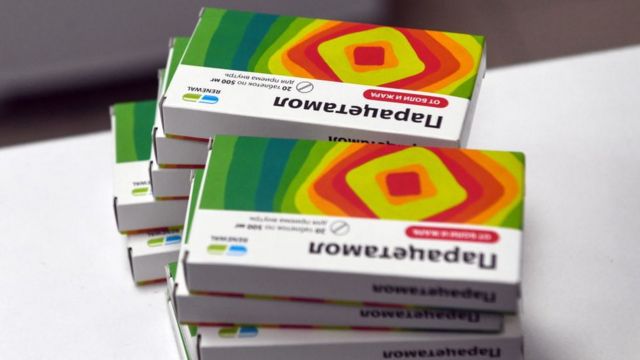Practitioners have long suspected that acetaminophen may further increase blood pressure in hypertensive patients, but there have been no real clinical trials on this issue. People with high blood pressure should use acetaminophen cautiously, as regular use of this popular anti-inflammatory and pain reliever can slightly raise blood pressure.
This is the conclusion of a study conducted by scientists from Edinburgh, Scotland, who investigated whether regular use of acetaminophen (known to American doctors as paracetamol) affects blood pressure in people with hypertension. “Acetaminophen is widely used as a first-line treatment for chronic pain because it is considered safe and, unlike nonsteroidal anti-inflammatory drugs, has virtually no effect on blood pressure (BP),” write the authors of an article published in the American Heart Association’s journal Circulation, one of the top three scientific journals devoted to cardiovascular disease. “Although studies based on observations [of patients] suggest that acetaminophen may actually increase blood pressure, clinical trials [testing this hypothesis] have not been conducted,” they caution.
A clinical trial involving 110 people with chronic hypertension was conducted at an Edinburgh clinic for over five years. The volunteers were divided into two groups. Participants in one group took 4 grams of acetaminophen daily for two weeks (four times a day, with a maximum daily dose of 1 gram, as recommended by the Department of Health). In the other group, volunteers were given a placebo disguised as acetaminophen. After these two weeks, the tablets were discontinued for the same period and then repeated – but with the opposite sign: volunteers from the experimental and control groups swapped places.
At the beginning and end of both intake periods, physicians monitored each subject’s blood pressure throughout the day by continuously recording tonometer readings. In addition, occasional readings were taken periodically during the experiment, with participants’ blood pressure being measured using several different methods. Summarizing the results, the researchers concluded that regular bi-weekly use of acetaminophen by hypertensive patients slightly increases their systolic blood pressure – by about 5 mmHg. According to the authors of the article, this, in turn, “increases the risk of developing cardiovascular disease, and in such a situation [when the patient suffers from hypertension], the safety of regular use of acetaminophen is questionable.”
Experts not involved in the research note that the Scottish experiment, while relatively modest in scale, was conducted according to the highest scientific standards developed for conducting similar studies. First, the authors used a randomized, double-blind, placebo-controlled method – that is, the participants were randomly divided into groups, and neither the volunteers nor their treating physicians knew whether they were taking real acetaminophen tablets or a placebo.

Paracetamol is the most commonly used antipyretic (fever-reducing medication), not least because of its maximum safety for the patient. We explain quickly, simply, and clearly what happened, why it matters, and what happens next. Episodes The end of history: Podcast Advertising.
Second, the study was conducted as a crossover: after a pre-planned two-week break (to allow the participants’ bodies to fully recover from taking the tablets), the positions of those taking acetaminophen and those taking placebo were reversed. This gives the experimenters the opportunity to compare the blood pressure of the participants not only with the results of the volunteers in the control group, but also with their own readings when taking a placebo. After all, each volunteer has countless other factors in his or her life besides taking acetaminophen that could strongly influence the results. In addition, if you compare the same patient’s indicators first when taking acetaminophen and then when taking a placebo (or vice versa), the results are much more reliable and trustworthy.
However, independent commentators, while highlighting the very compelling findings of the study, emphasize that they should not be attributed to people who take acetaminophen irregularly or for only a few days to relieve headaches, fever and other symptoms of general inflammation. Even those who really drink this popular painkiller often and in large quantities should not forget that the participants in the experiment were originally selected from patients who already suffered from chronically elevated blood pressure for a certain period of time.
“The results of any randomized trial only apply to people who are similar to the trial participants in a number of ways. That is why the selection criteria for clinical trials are always very clear: who can take part and who cannot,” says Kevin McConway, Professor of Applied Statistics at The Open University. “Although this specific study does not directly indicate that acetaminophen raises blood pressure in patients who do not have hypertension, it is quite possible that long-term use of this medication at comparable doses may have the same effect in them,” he notes.
Dipender Gill, who studies clinical pharmacology at St. George’s University in London, calls for caution in interpreting the results of the experiment and lists several unknowns that could theoretically reduce the reliability of the conclusions drawn by the study’s authors. First of all, it is not known how long the increased pressure will last in hypertensive patients who continue to take acetaminophen regularly. Second, the fact that regular use of acetaminophen slightly increases blood pressure in hypertensive patients does not necessarily mean that the risk of developing cardiovascular disease also increases. Third, increased blood pressure is often a symptom of pain and muscle tension. Therefore, it cannot be ruled out that by relieving pain, acetaminophen may also help to reduce the symptoms of hypertension. Finally, fourth, all the participants in the Scottish hypertension experiment were white people from Europe. A study involving people from Asia and Africa might yield a slightly different result.
And yet, overall, the scientific work received high praise from both medical theorists and practicing physicians. “High blood pressure is the main factor determining the risk of stroke development in patients,” recalls Richard Francis, Chief Scientific Officer of the British Stroke Association. “New research confirms the conclusion that several other studies (based on indirect evidence) have already reached. Regular use of paracetamol rapidly raises blood pressure in people who are already at risk of stroke and heart attack. It is therefore very important that doctors regularly review and weigh up all the risks and benefits associated with prescribing paracetamol,” the expert concludes.

